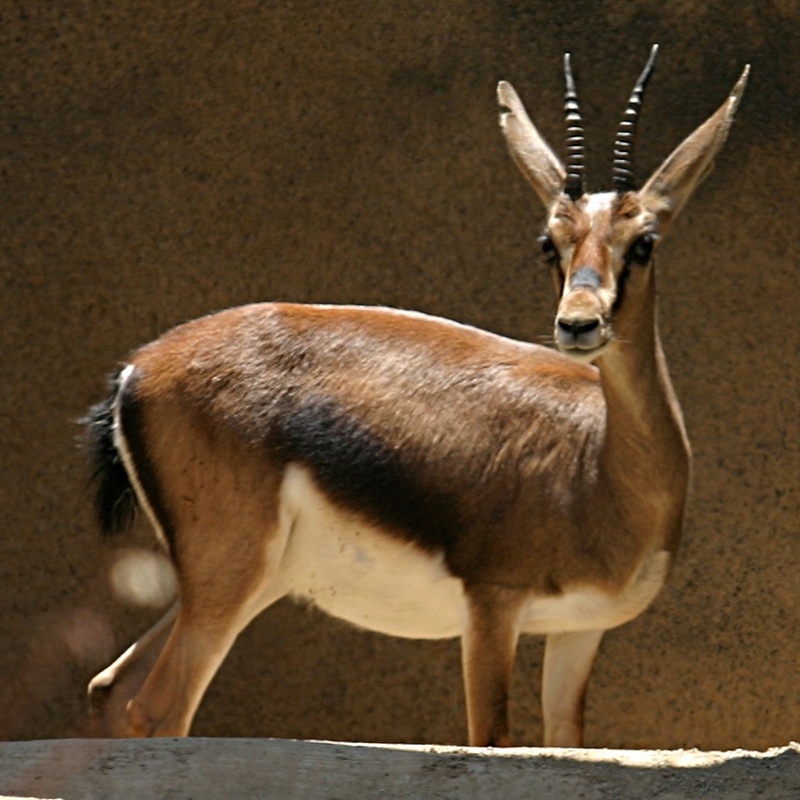|
| Query: Gazelle | Result: 8th of 242 | |
Cuvier's Gazelle (Gazella cuvieri) - Wiki
| Subject: | Cuvier's Gazelle (Gazella cuvieri) - Wiki
| |

| Resolution: 856x856
File Size: 214573 Bytes
Date: 2007:05:29 15:14:56
Camera: Canon EOS DIGITAL REBEL (Canon)
F number: f/4.5
Exposure: 1/500 sec
Focal Length: 165/1
Upload Date: 2007:11:29 15:43:16
|
Cuvier's Gazelle
From Wikipedia, the free encyclopedia
Order: Artiodactyla
Family: Bovidae
Subfamily: Antilopinae
[Photo] Cuvier's Gazelle (Gazella cuvieri) at the San Diego Zoo in San Diego, California, USA. Date May 29, 2007. Author Colin M.L. Burnett (http://en.wikipedia.org/wiki/User:Cburnett). Copyright (C) 2007 Colin M.L. Burnett
Permission is granted to copy, distribute and/or modify this document under the terms of the GNU Free Documentation License, Version 1.2 or any later version published by the Free Software Foundation; with no Invariant Sections, no Front-Cover Texts, and no Back-Cover Texts. A copy of the license is included in the section entitled "GNU Free Documentation License". |
Cuvier's Gazelle Gazella cuvieri is a species of gazelle from northern Africa. It was named for the scientist Georges Cuvier.
From 3rd Grader Evan Mageo's Research
Appearance
The Cuvier’s Gazelle’s coloration is a very dark brown back, it’s head and legs match with a white belly and a ramp patch. The tail is a tiny black and the top of his (or her) nose has a distinct black spot. The gazelle’s face has black lines running from the large ears to the nose. It has upright, curled horns that are present in both sexes and may reach 35 cm in length.
Habitat
Cuvier’s Gazelle are found in a range of habitats, including open oak forests, open country, mostly grasslands, vineyards and are quite rare in stony desert plateaus. It appears only at high altitude in the Atlas Mountains.
Behavior
Cuvier’s Gazelles live in spaced out areas and generally are not seen in groups bigger than eight animals. Groups usually contain one male and females with young.
Food Supply
Like most gazelles in nature, Cuvier’s Gazelle are always on the run chewing grass and succulent plants. As with most ruminants, they consume large quantities of plants and grass then lie in a safe, cool place to eat their cud, a process which further absorbing their very high cellulose nutrition.
Fact Files
These gazelles are the only gazelle able to give birth to twins. They are very rare. They are the only gazelles native to the north of the Sahara Desert.
Reproduction
The Cuvier’s Gazelle can birth twins although it is rare. The gestation period is rought 170 days. In times of plenty, middle aged females can have two litters a year. They can live to be roughly 14 years old.
Enemies and Endangerment
The enemies of the gazelle are domestic sheep, goats and humans. The sheep and goats compete with the gazelles for grazing spots sometimes pushing them out of their territory. Humans hunt them for their meat and rare skin.
Saving My Animal
Two things can be done to save my animal. One is to pass laws making it illegal to hunt them. The other is to make more places for them to graze.
http://en.wikipedia.org/wiki/Cuvier's_Gazelle
| The text in this page is based on the copyrighted Wikipedia article shown in above URL. It is used under the GNU Free Documentation License. You may redistribute it, verbatim or modified, providing that you comply with the terms of the GFDL. |
|
Comments |
|---|
| | cialis |
|
| AwO5uK hvekxxss izvaupnf xcwpyezn |
^o^
Animal Pictures Archive for smart phones
^o^
|
|
|

